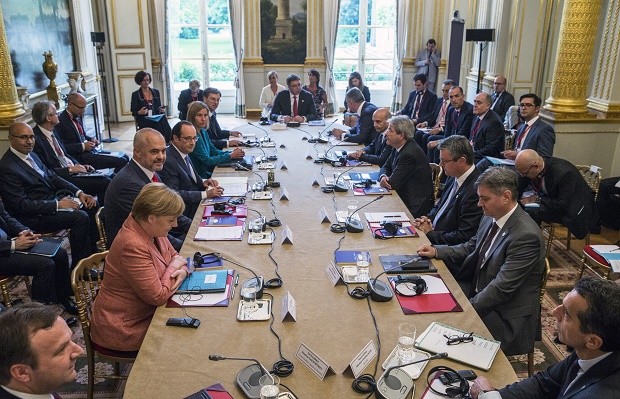
Delegations from the Balkans sit around a table around French President Francois Hollande, fourth from left, and German Chancellor Angela Merkel, second from left, during the Balkan summit hosted by France at the Elysee Palace in Paris, Monday July 4, 2016. The leaders of France, Germany, Italy and Balkan nations are meeting to better prevent extremists from sneaking in with migrants who are moving west across Europe. AP
PARIS — The leaders of France and Germany assured prospective EU members in the Balkans on Monday that the British vote to leave the union won’t threaten eventual enlargement of the bloc.
Balkan nations that survived wars and political breakups in the 1990s worry they will face more hurdles to membership as the EU struggles to keep itself together. And pro-Russian forces in countries such as Serbia are hoping to sway the region toward Moscow and away from the West, as the Brexit vote throws European unity into question.
French President Francois Hollande and German Chancellor Angela Merkel sought to soothe worries about European stability at a Balkans summit in Paris on Monday, notably by boosting opportunities for youths from countries that dream of joining the EU.
While the EU last week delayed further membership talks with Serbia, Hollande insisted Monday, “The British decision does not in any way put into question commitments made toward countries in the Balkan region. They will be respected.”
READ: ‘Brexit’ and globalization
Merkel said the EU’s enlargement strategy “has not changed with the decision of the U.K.”
Serbian Prime Minister Aleksandar Vucic said at Monday’s summit that his country wouldn’t be “subservient” to the union, but over the long term, Europe “is the place where the future is best for our people.”
“We have a lot of work and efforts before us, and obligations. But it seems to me that we have clear and unequivocal prospects in Europe,” he told reporters at the Elysee Palace.
Serbia, Montenegro, Macedonia, Bosnia, Kosovo and Albania say the British exit vote won’t diminish their EU membership efforts.
Monday’s summit also addressed ways to better prevent extremists from sneaking in with migrants who are moving west across Europe. A handful of violent extremists are known to have mixed in with the more than 1 million migrants crossing into Europe last year, including through the Balkans. That route is largely shut now, but migrant pressure persists.
Croatian Prime Minister Tihomir Oreskovic said, “we have to think about how to do all we can to neutralize these terrorist threats, foreign fighters,” without elaborating.
Amid concerns that the British exit vote could close off opportunities for Balkan youth looking to opportunity in the West, the leaders signed an agreement Monday on youth exchanges with non-EU members, special visas and an “office for Balkan youth.”
Merkel and Hollande met Austria’s chancellor, Italy’s finance minister and leaders of Albania, Bosnia-Herzegovina, Croatia, Kosovo, Macedonia, Montenegro, Serbia and Slovenia.
READ: Brexit, a sign of anti-elite revolt—analysts